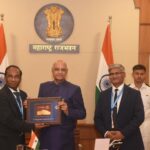He insists that both narrative and documentary filmmaking have the same components and its just the etake that is separates them. "Well, they have actors while we shoot real people. What is paramount is the skill to tell a story. Moreover, Ive never believed in this false divide, as the documentaries we make tend to cross it frequently. However, at this point of time, I feel its time for us to work on a narrative," says three-time National Award filmmaker Nandan Saxena (along with his filmmaker wife Kavita Bahl), who is now all set to make a feature film titled "Mrigtrishna" (The Mirage).
Saxena who already has a French producer and is looking for an Indian one, has signed Himanshu Joshi (of Indian Ocean) for the lead character is now planning to approach Alia Bhatt with a bound script to play the character of a young woman who loses her husband and goes to Vrindavan. "But that place imposes its own set of rules which are very regimented and claustrophobic. She finds herself in a glass menagerie and doesn't know what to do with her life anymore. Amidst women in white floating around like ghosts in a timeless mist, can she find love, and more importantly herself?" he says.
And the film is the reason the couple shifted base from Delhi where they had been living for more than 50 years, to Mumbai. "Delhi just doesn't have that kind of energy, ethos and culture. Out there, everybody is an island in himself. Despite so many of documentary filmmakers living in the Capital , we would meet only during festivals organised in places like Goa, Dharamsala and Mumbai. In Mumbai, we do an 'addabazi' of filmmakers, theatre artists, painters and musicians at least twice a week," he smiles.
Known for his documentaries like "I Cannot Give You My Forest", "Candles in the Wind" and "Cotton for My Shroud" which he co-directed with Behl – all of which won the National Award, the filmmakers recently completed a character driven documentary for Films Division titled "Laxman Rekha" which centres around Laxman Singh of Rajasthan, who has been instrumental in charging the water table of around 50 villages between Jaipur and Ajmer Sharif. Singh floated the organisation eGramin Vikas Navyuvak Mandal' that encourages villagers to revive ponds in order to recharge the water table.
Saxena elaborates: "This film too has been entered for the National Award. When Singh started doing it in his Lapodia village years ago, everyone took him for a fool. But after he and his friends repaired the village pond with help of some volunteers, the dried up wells got recharged and the villagers were able to cultivate two crops in a year instead one. He then spread the movement to other villages. Interestingly, he got the idea after reading Anupam Mishra's book eAaj Bhi Khare Hai Talab'."
"With an oeuvre spanning domains of ecology, livelihoods, development and poetry films, and despite multiple National awards, funding still remains an issue. Awards are recognition that you're doing good work and they make it easy for our films to travel. People don't take pangas much, don't stop screenings, as they know we have a Censor certificate and a National Award. However, getting funds for a documentary is a constant struggle, and of course, then comes the lack of a distribution network. Features still have commercial model. All other countries support documentaries more than feature films. In India, people are yet to realise that documentarians are chroniclers of the times. If we don't keep the facts alive, then tomorrow, any narrative, far from truth will emerge and nobody would be able to counter it."
Mentioning how their films are distributed by unions, activists and farmers' association across the country including Andhra Pradesh, South India and Punjab, and he asserts: "We give them the prints to make copies, and also allow them to keep the money that comes from the sale. It is important that a large number of people get to know the ground situation. We have worked on the plight of cotton farmers, issues of widows of farmers who brought about the green revolution, and those who committed suicide. In so many families, there are double and triple suicides. We walked in villages in several districts of Punjab and shot the plight of suicide survivors. Believe me, Kavita and I felt that we would become depression patients."
Despite the OTT revolution. Saxena does not feel that the platform is ready for the kind of content they produce. "We did speak to some senior at major platforms. They said they were following our work, but needed time. Frankly, what interests them at this point is travel and food, and of course sensational and racy documentaries produced by some outlets. As far as people like us, who work on human rights are concerned, well… The government calls us anti-national and urban naxals while corporates feel we are out to destroy them."
While most governments in the west support documentary filmmakers considering, the filmmaker feels that in India, it makes sense not to expect anything.
"Here, we don't have pride. Now look at China, which is investing heavily in art and culture because they realise its potential. After filmmakers Shyam Benegal and Adoor Gopalakrishnan, and critic Aruna Vasudev praised our work at different forums, the PSBT approached us. We made a film with them for Doordarshan for which they gave us six lakhs, while it costed us four times more. Do I say more?"


































Nandan ji,
Great.
you are telling the real story of small documentary filmmaker.
The bitter truth
best wishes for your upcoming feature film The Mirage.
Ram Bharati,Filmmaker
director,
Digipower Media Foundation
Tel; 9717654115